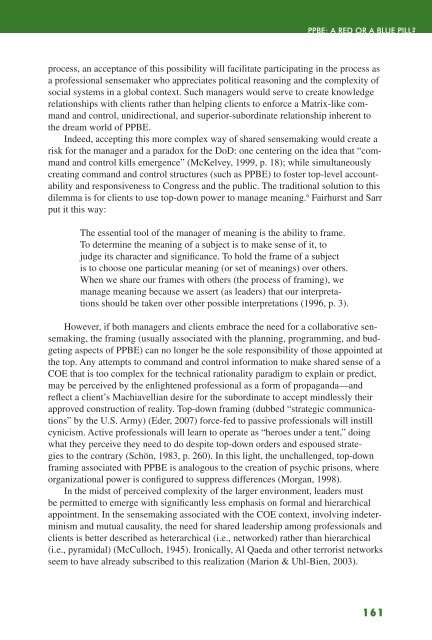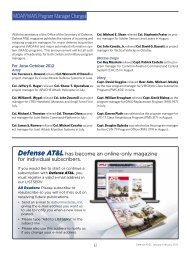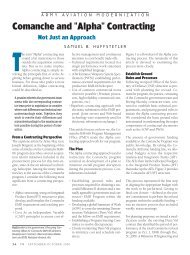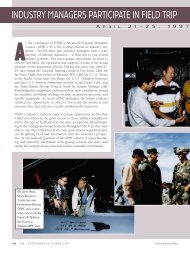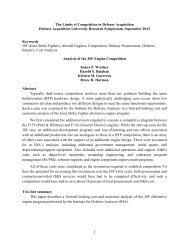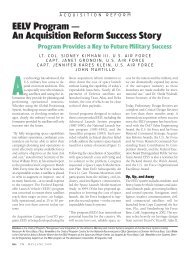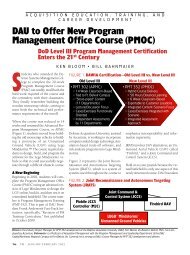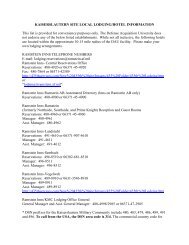Defense ARJ - Defense Acquisition University
Defense ARJ - Defense Acquisition University
Defense ARJ - Defense Acquisition University
You also want an ePaper? Increase the reach of your titles
YUMPU automatically turns print PDFs into web optimized ePapers that Google loves.
PPBe: a reD or a Blue Pill?<br />
process, an acceptance of this possibility will facilitate participating in the process as<br />
a professional sensemaker who appreciates political reasoning and the complexity of<br />
social systems in a global context. Such managers would serve to create knowledge<br />
relationships with clients rather than helping clients to enforce a Matrix-like command<br />
and control, unidirectional, and superior-subordinate relationship inherent to<br />
the dream world of PPBE.<br />
Indeed, accepting this more complex way of shared sensemaking would create a<br />
risk for the manager and a paradox for the DoD: one centering on the idea that “command<br />
and control kills emergence” (McKelvey, 1999, p. 18); while simultaneously<br />
creating command and control structures (such as PPBE) to foster top-level accountability<br />
and responsiveness to Congress and the public. The traditional solution to this<br />
dilemma is for clients to use top-down power to manage meaning. 6 Fairhurst and Sarr<br />
put it this way:<br />
The essential tool of the manager of meaning is the ability to frame.<br />
To determine the meaning of a subject is to make sense of it, to<br />
judge its character and significance. To hold the frame of a subject<br />
is to choose one particular meaning (or set of meanings) over others.<br />
When we share our frames with others (the process of framing), we<br />
manage meaning because we assert (as leaders) that our interpretations<br />
should be taken over other possible interpretations (1996, p. 3).<br />
However, if both managers and clients embrace the need for a collaborative sensemaking,<br />
the framing (usually associated with the planning, programming, and budgeting<br />
aspects of PPBE) can no longer be the sole responsibility of those appointed at<br />
the top. Any attempts to command and control information to make shared sense of a<br />
COE that is too complex for the technical rationality paradigm to explain or predict,<br />
may be perceived by the enlightened professional as a form of propaganda—and<br />
reflect a client’s Machiavellian desire for the subordinate to accept mindlessly their<br />
approved construction of reality. Top-down framing (dubbed “strategic communications”<br />
by the U.S. Army) (Eder, 2007) force-fed to passive professionals will instill<br />
cynicism. Active professionals will learn to operate as “heroes under a tent,” doing<br />
what they perceive they need to do despite top-down orders and espoused strategies<br />
to the contrary (Schön, 1983, p. 260). In this light, the unchallenged, top-down<br />
framing associated with PPBE is analogous to the creation of psychic prisons, where<br />
organizational power is configured to suppress differences (Morgan, 1998).<br />
In the midst of perceived complexity of the larger environment, leaders must<br />
be permitted to emerge with significantly less emphasis on formal and hierarchical<br />
appointment. In the sensemaking associated with the COE context, involving indeterminism<br />
and mutual causality, the need for shared leadership among professionals and<br />
clients is better described as heterarchical (i.e., networked) rather than hierarchical<br />
(i.e., pyramidal) (McCulloch, 1945). Ironically, Al Qaeda and other terrorist networks<br />
seem to have already subscribed to this realization (Marion & Uhl-Bien, 2003).<br />
1 6 1


